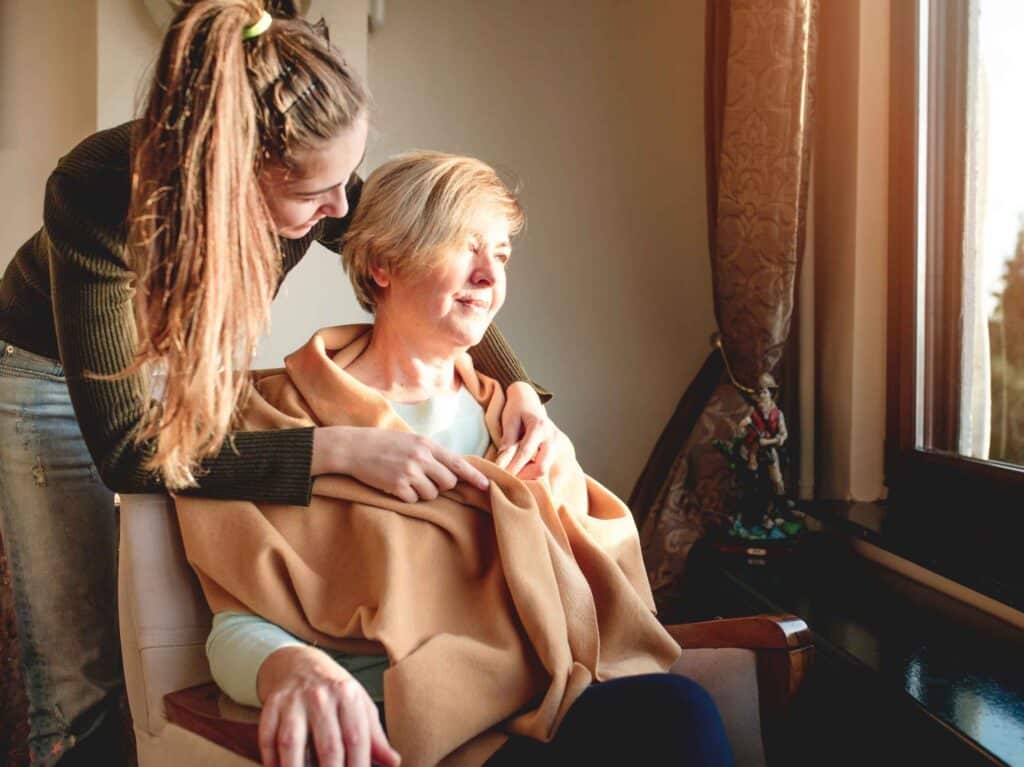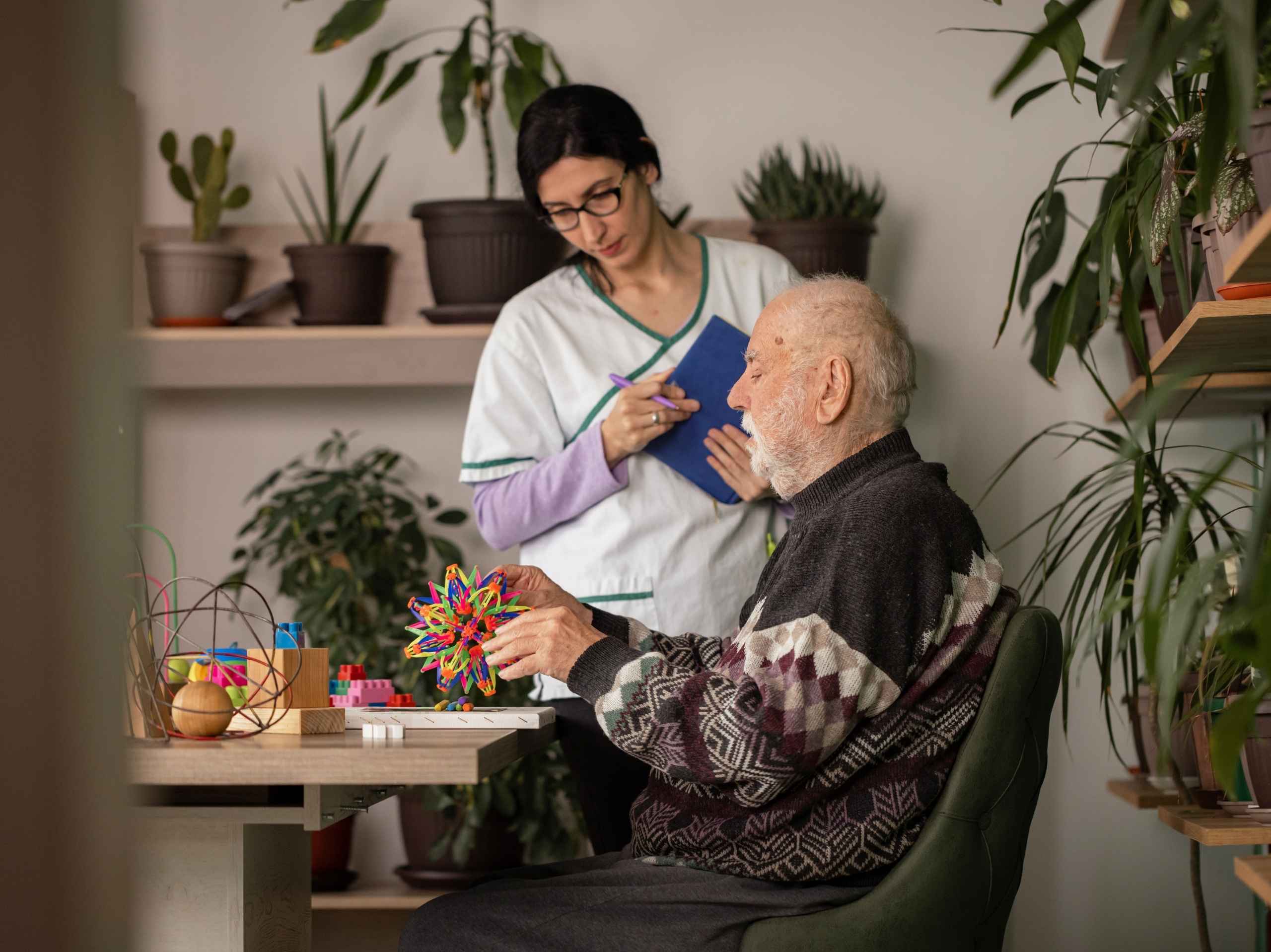Dementia can reshape nearly every aspect of daily life—for both the person experiencing it and their loved ones. From memory loss and confusion to emotional changes and safety concerns, the effects of dementia require thoughtful, consistent, and compassionate support. While there’s no cure, the right care can greatly enhance comfort, wellbeing, and independence.
For individuals living with dementia, in-home support offers a safe and familiar setting that supports continuity, dignity, and peace of mind. Under the National Disability Insurance Scheme (NDIS), participants with younger-onset dementia or related conditions can access funding for personalised services designed to meet their unique needs.
This article explores why dementia requires a tailored approach, what kind of NDIS in-home dementia support is available, how support can be customised for each person, and how Reaching Abilities provides compassionate, professional care across Western Australia.
Why Dementia Requires a Tailored Approach
Dementia is a progressive neurological condition that affects memory, thinking, behaviour, and the ability to perform everyday tasks. It develops over time, with symptoms and needs evolving along the way. Common types include Alzheimer’s disease, vascular dementia, frontotemporal dementia, and Lewy body dementia—all of which can present differently from person to person.
This variability is why a one-size-fits-all support model simply doesn’t work. One participant may need help with basic hygiene and wandering prevention, while another may benefit more from cognitive stimulation and companionship. Emotional wellbeing is just as important as physical safety—so services must reflect each person’s habits, history, and personality.
Tailored support for memory loss doesn’t just improve daily living—it can also reduce anxiety, help retain skills, and maintain dignity as abilities change. This is the heart of person-centred dementia care, which respects each person’s background, preferences, and pace.
What NDIS In-Home Support Can Include for Dementia Participants
The NDIS recognises that participants with dementia need care that is flexible, practical, and grounded in everyday routines. That’s why in-home support can be funded under Core Supports (Assistance with Daily Living) or Capacity Building categories, depending on the participant’s goals and needs.
Here are some key NDIS in-home dementia support services available:
- Medication prompts and supervision – ensuring medication is taken on time and correctly, reducing risks of missed or double doses.
- Meal preparation and feeding assistance – supporting healthy eating habits, catering for changes in appetite or ability, and avoiding nutritional deficiencies.
- Personal care – helping with showering, dressing, grooming, and toileting while preserving independence and dignity.
- Home safety monitoring – checking for trip hazards, stove safety, and wandering risks, supporting home safety for dementia participants.
- Companionship and supervision – reducing feelings of isolation, and providing peace of mind for families when they can’t be present.
- Cognitive stimulation and gentle activities – such as music therapy, puzzles, memory games, or reminiscing conversations to maintain mental engagement and joy.
- Transport assistance – helping participants attend appointments, therapies, or community activities safely and comfortably.
These services not only provide practical support—they also build trust and routine, which are critical for dementia care. Having a consistent support team makes all the difference in reducing confusion and distress.
How to Customise In-Home Support for Dementia
Personalisation is key when providing NDIS personalised care for dementia. Each participant brings a unique history, set of preferences, and stage of cognitive ability. Creating a supportive, stable, and engaging home environment requires planning and flexibility.
1. Establish Consistent Routines
Routine brings reassurance. Support workers should follow a predictable daily rhythm, aligning with the participant’s natural habits. Meals, hygiene tasks, and activities should happen at roughly the same time each day to reduce confusion and anxiety.
2. Match Participants with the Right Support Workers
Continuity of care builds trust. It’s important to match participants with support workers who understand their communication style, cultural background, and personal interests. When support feels familiar, participants are more comfortable and cooperative.
3. Use Familiar Items and Environments for Comfort
A person’s home should remain a dementia-friendly space, with recognisable objects, photographs, and personal belongings. These provide orientation cues and a sense of safety. Small adjustments—like labelled cupboards or visual calendars—can make everyday tasks easier.
4. Engage with Meaningful Activities
Stimulating the mind and maintaining joy is essential. Support workers can engage participants in hobbies and tasks they’ve always loved—like gardening, painting, cooking, or listening to music. Activities don’t need to be complicated—they just need to feel purposeful.
Sample of Daily Routine Plan for Dementia Support
- 7:30am – Wake-up, shower, and get dressed
- 8:00am – Breakfast and medication
- 9:00am – Short walk or light exercise
- 10:00am – Puzzle, music, or reminiscing activity
- 12:00pm – Lunch and quiet time
- 2:00pm – Outdoor time, gardening, or craft
- 4:00pm – Tea and TV time
- 6:00pm – Dinner
- 7:30pm – Bedtime routine
Customised care transforms the home into a safe, supportive, and enriching environment—making it easier for participants to maintain independence for as long as possible.

Reaching Abilities’ Approach to In-Home Dementia Care
At Reaching Abilities, we know that dementia care requires more than just training—it requires patience, understanding, and genuine connection. That’s why our in-home support services are built on empathy, consistency, and a deep respect for every individual we serve. We focus on more than just meeting clinical needs—we strive to create moments of joy, comfort, and security every day.
All WA Staff Trained in Dementia Care
Our team is carefully selected and fully trained in dementia-friendly services, including managing behavioural changes, supporting memory loss, preventing agitation, and communicating clearly and calmly. We provide all team members with ongoing professional development, covering the latest techniques in person-centred dementia care. This ensures our support workers are equipped not only with knowledge but with the confidence to respond to evolving needs compassionately and competently.
Continuity and Routine Reviews
We understand the power of familiarity. Participants benefit most when supported by familiar, trusted faces. That’s why we assign regular team members to each participant, supporting continuity of care and trust. Our coordinators also conduct frequent reviews of routines and behaviours to make timely adjustments. These check-ins allow us to respond proactively to cognitive changes, mobility shifts, or emotional needs—keeping care aligned with the participant’s wellbeing.
Example in Action
One of our participants, Margaret, has younger-onset Alzheimer’s and lives at home with her husband. Through a tailored support plan, we introduced memory cues such as photo-labelled drawers, calming music during morning routines, and a large-font wall calendar. We also scheduled daily visits to assist with personal care and meal prep. Over time, Margaret became more settled and confident. She even began engaging in light gardening and enjoyed regular tea chats with her support worker—bringing both routine and joy back into her life.
These small but powerful outcomes reflect our approach: deeply personalised, family-inclusive, and rooted in dignity.
At Reaching Abilities, we’re proud to offer dementia care across WA that balances professionalism with heartfelt compassion—helping individuals remain safely and happily in their own homes for longer. Whether someone is in the early or more advanced stages of dementia, our services flex and grow with their changing needs.
Familiar Care, Brighter Days
Dementia may bring uncertainty, but the right in-home support brings structure, comfort, and hope. With a personalised approach, participants can live safely in familiar surroundings while preserving their dignity and independence.
Reaching Abilities is committed to delivering high-quality, person-centred dementia care across Western Australia. Our team understands the complexities of dementia and is here to walk beside you with professionalism, kindness, and unwavering support.
Contact Reaching Abilities to learn how we support dementia care with compassion and professionalism.

Ozer Tanlasi – Founder and Director of Reaching Abilities
Ozer Tanlasi is the Founder and Director of Reaching Abilities, an organisation dedicated to providing compassionate and empowering support to individuals with disabilities. With a background in allied health and a deep commitment to inclusive care, Ozer established Reaching Abilities to create a welcoming space where individuals can thrive, gain independence, and achieve their personal goals. Her approach is centred around understanding each individual’s unique needs and strengths, ensuring they receive tailored services that make a positive impact on their lives. Under Ozer’s leadership, Reaching Abilities has become known for its compassionate, client-focused approach, supporting individuals and families in building meaningful connections and reaching new potentials.






